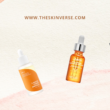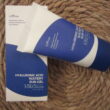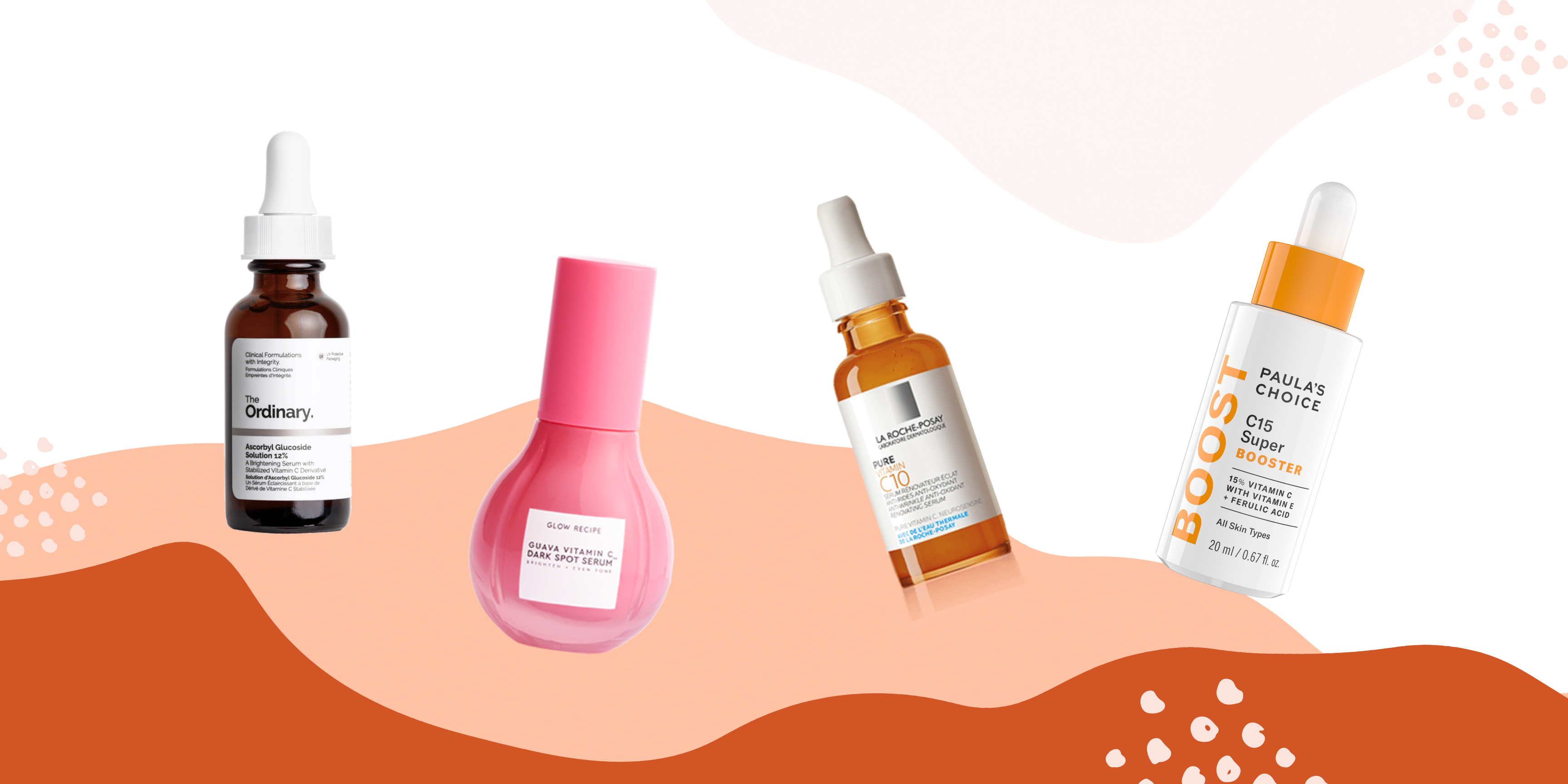Side effects of vitamin C serums aren’t a myth, and there are things you can do to prevent them. However, there are real heroes who truly fight the fight against skin aging, and vitamin C is one of them. If you are in the skincare game for a while, you might have heard of its endless benefits represented in products such as serums, eye creams.
Just like with every skin ingredient out there, vitamin C side effects still happen. Today I am narrowing it down even further to vitamin C serum side effects. So, let’s dive into this right away and figure out what can cause vitamin C to “break” your skin.
But first, what is Vitamin C?
Also known as ascorbic acid, it is one of the most important antioxidants in general. It is perhaps the most touted ingredient by dermatologists for a solid reason. Vitamin C offers numerous benefits for overall health and your skin of course.
As a general rule, vitamin C is not synthesized in the body, but comes from the food we take: citrus fruits, berries, tomatoes, peppers, rose hips.
Truth be told, the skin does not always get it in the right amount. Even with the use of large doses, the absorption of the vitamin by your intestines is limited.
With the existing deficiency of vitamin C, the more “vital” organs of our body are first “takers”, and it enters the skin according to the residual principle. That is exactly why it is mostly recommended to make up for the lack of its intake with the help of skincare products.
So, these are the main benefits of Vitamin C for that glowy, healthy skin:
- It has an amazing hydrating effect on the skin;
- Vitamin C is a powerful antioxidant – when our own defense system fails, it disarms the free radicals that damage cells;
- It has anti-inflammatory properties;
- Vitamin C stimulates collagen production;
- Studies show that it helps reduce the appearance of wrinkles
- Discourages the production of eumelanin, which helps to lighten pigmentation, face dark spots, and return the skin its radiance;
- Vitamin C enriched eye serums can help the skin deal with the appearance of under eye circles;
- It acts as an anti-aging agent in skincare;
- It fight against environmental aggressor such as free radicals
- It has been proven that Vitamin C is effective in acne treatment
How to look for vitamin C on skincare product labels?
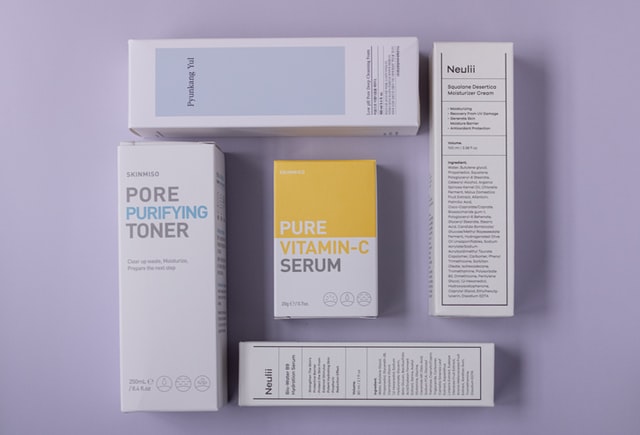
Vitamin C‘s ability to improve skin health and combat virtually all signs of aging has been known for many years. But to get its stable forms, benefiting the skin in cream consistencies to the maximum, has been revealed relatively recently. After all, ascorbic acid has an insidious property to quickly oxidize in air. Make sure that vitamin C and its derivatives come at the top of the label, ideally among the first five names.
Nowadays, vitamin C is used in skincare in the form of:
- Ascorbic acid (L-ascorbic acid) – most common
- Ascorbyl/ Ascorbate 6-palmitate
- Ascorbyl glucoside
- Magnesium Ascorbyl Phosphate (MAP)
- Ester-C (calcium ascorbate)
How to use Vitamin C serums in skincare routine?
The use of ascorbic acid in skincare formulations is generally tolerated by all skin types. However, sunscreen should be applied over brightening or anti-aging vitamin C products.
How to use vitamin C serums? Simple! After cleansing your face, apply a few drops of vitamin C serum on your face. Don’t forget your neck! Then, apply your moisturizer + sunscreen. (the heavenly combo)
You might get a tingling sensation after using Vitamin C, it is completely normal. However, if it doesn’t go away and irritate your skin stop using it. More on that later in talking about the side effects of vitamin C serums.
What time of the day should you use Vitamin C serums?
Generally, it is used in the morning, but formulations with higher concentrations (20%) can be used in the evening. Higher concentrations are more effective while combating dark spots and discolorations. It is also ok to use products with lower concentrations such as 0.6% is also effective for the skin.
How often should you use vitamin C serums?
It is totally up to you to apply it once or twice a day. You can apply your Vitamin C serum right after toning and before moisturizing your skin. Plus, consistency is key. By using vitamin C serums in the morning (+ SPF 30, at least) you will protect your skin from damaging sunlight. Using it in your PM skincare will help your skin repair itself basically from daily wear and tear.
How do vitamin C serums work?
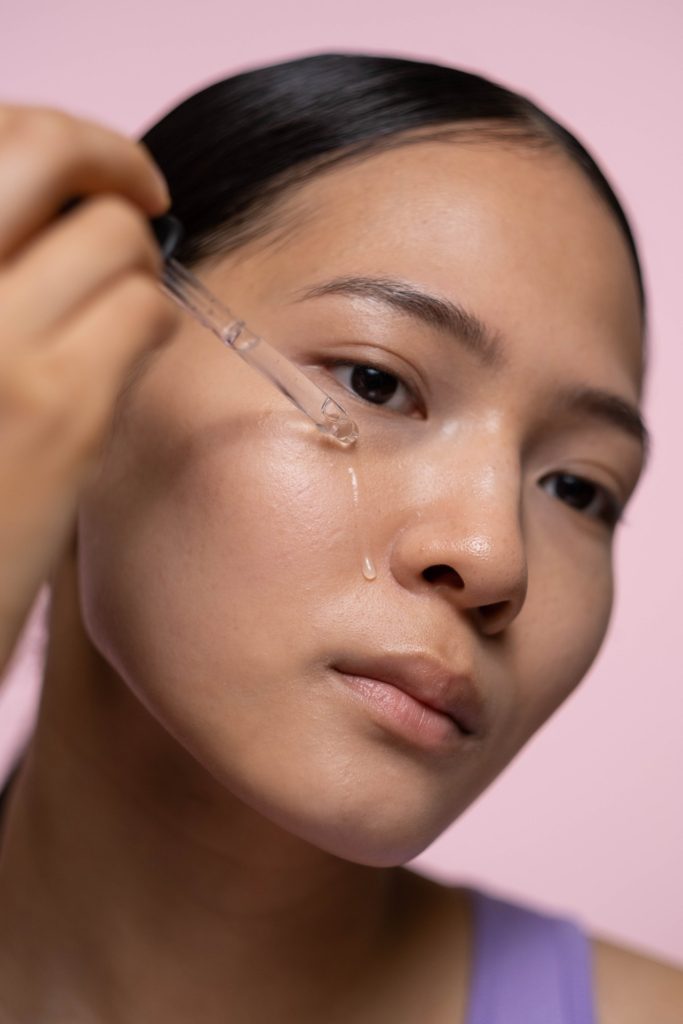
Here I am going to get a bit scientific-ish, so bear with me. Being an antioxidant, it works with both the epidermis (outer layer of skin) and dermis (layer of the skin between the epidermis and subcutaneous tissues, aka the deepest layer of the skin).
You can expect the early effect on the skin from 3 to 6 months. Make sure you pick the right type of product with Vitamin C; make sure it is stored in an opaque, air-tight container/bottle with its consistency being transparent and light. Since it is very sensitive to light, it can break down easily and lose its effect if stored the wrong way. You can store it for 6 months after opening.
Who shouldn’t use Vitamin C serums?
Although it is not very common for Vitamin C serums to present an allergic reaction, it is still possible. If you are extremely sensitive and your skin reacts to many things, be extra careful. always do a patch test before you try any type of serum. Wait for a day and if there is no allergic reaction, go on with the routine.
NEVER mix these ingredients with Vitamin C serums:
- Niacinamide;
- Retinol;
- AHAs/BHAs
- Copper peptides
Find out why in The List of Top 8 Skincare Ingredients Not To Mix.
What are the side effects of Vitamin C serum?

I personally think the benefits of vitamin C serums outweigh the side effects of using vitamin C serums. But that doesn’t change the fact that there are some side effects of Vitamin C serums to be aware of. Here’s why:
Side effects of Vitamin C serums #1: Skin irritation
This one comes at the top of the list among possible side effects of Vitamin C serums. You get the discomfort followed by redness, and yes this is the first sign of skin irritation. This means that your skin is either allergic to L-Ascorbic acid, or your skin is sensitive and doesn’t tolerate vitamin C in general.
A solution to skin irritation? If your skin is on the dry side, try to swap L-Ascorbic acid for Magnesium Ascorbyl Phosphate (MAP), one of the derivatives we mentioned above. It is a more stable and gentler option that might work on your skin better.
To prevent this kind of irritation, keep in mind that some skincare ingredients shouldn’t be mixed with Vitamin C serums. Retinol, Salicylic acid, AHAs like Lactic acid, and Glycolic acid are a strict no-no when you have Vitamin C serum in your regimen. If you mix these, the result is bound to be irritating.
Side effects of Vitamin C serums #2: Skin breakouts
Using vitamin C serums isn’t a black and white business. Even though generally speaking, using vitamin C can help you fight breakouts, some people can experience worsened acne situations after using a vitamin C serum, for example. And why is that? Although there is no definitive answer, there is something you can do about it.
It is all about being informed and reading the product labels carefully. Looking for Sodium Ascorbyl Phosphate (SAP) in the product label might come in handy. This is technically a derivative of vitamin C, aka L-Ascorbic acid. Acne is mainly caused by acne bacteria. This study shows that even with a 1% concentration, SAP has a strong antimicrobial effect and helps in acne treatment.
Side effects of Vitamin C serums #3: Extremely dry, flaky skin
If you overdo the Vitamin C game, you might end up with extremely dry, almost flaky skin. That’s why it is important not to use too much of it thinking it will benefit your skin more. Using too much Vitamin will sort of over-exfoliate the skin and you don’t want that.
If you have overused it and your skin is bone dry, stop using it and moisturize your skin. That skin has to repair itself. Your skin will repair itself soon, you just have to compensate for the lost moisture. Gotta give it some time to recover from vitamin C serum side effects.
Once you get the hang of using Vitamin C serum, your skin will have a chance to adjust to it accordingly. NEVER forget about sunscreen, as using a vitamin C serum without sunscreen is basically skin suicide.
Side effects of Vitamin C serums #4: High percentage of Vitamin C serum
This one can actually be the starting point of the common Vitamin C serum side effects. Understanding the concentration of vitamin C serums is at the core of its usage. If your skin is irritated and sensitive, chances are you have used a highly concentrated vitamin C serum.
Solution? As a rule of thumb, start with lower percentages. A vitamin C serum at 10% will work just fine, especially if you have sensitive skin. Once your skin gets used to it, you might build it up to 20%, for instance. Generally, 10% – 20% is considered the sweet spot, so going over 20% can lead to side effects mentioned above like irritation, dry skin.
How to pick the right Vitamin C serum that works for your skin?
Seems like we were in a dark place so far, (which is where you should store your Vitamin C serums btw) but there is a light at the end of the tunnel!
Go scavenger hunting for your go-to vitamin C serum. I mean, really. Do it! You have to see what’s out there.
When I started out my Vitamin C serum journey, I had to look for a product that wouldn’t irritate my sensitive skin and contain ingredients that treat my redness. That’s how I found Freshly Juiced Vitamin C Drop by Dear Klairs. It is a low concentrated (5%) serum formulated with one of the star ingredients for redness – Centella Asiatica. If you have not heard about it check out our blog post on its wonders.
It is under 25 dollars, so it didn’t break the bank, plus I love K-beauty, so it is the one for me.
So, it is really about looking for a product that works for you. In my case, it is post-acne marks and redness. So, being on alert for new products or just other tried and true Vitamin C products is key.
If you are a skincare junkie, I am sure you already have your own methods 🙂
Key Takeaway
When it comes to fighting hyperpigmentation, dull skin, dealing with blemishes, Vitamin C is the golden child of antioxidants. Being consistent with the application in the routine is also key to seeing the long-term benefits.
However, be wary of its effect on your skin before making it a go-to ingredient for you. Consider your skin type before you face the side effects of Vitamin C serums and do your research.
Although side effects of vitamin C serum aren’t permanent, they shouldn’t be taken lightly. This is exactly why we are here to help you out. Your skin is the most valuable commodity, make sure you take care of it.



